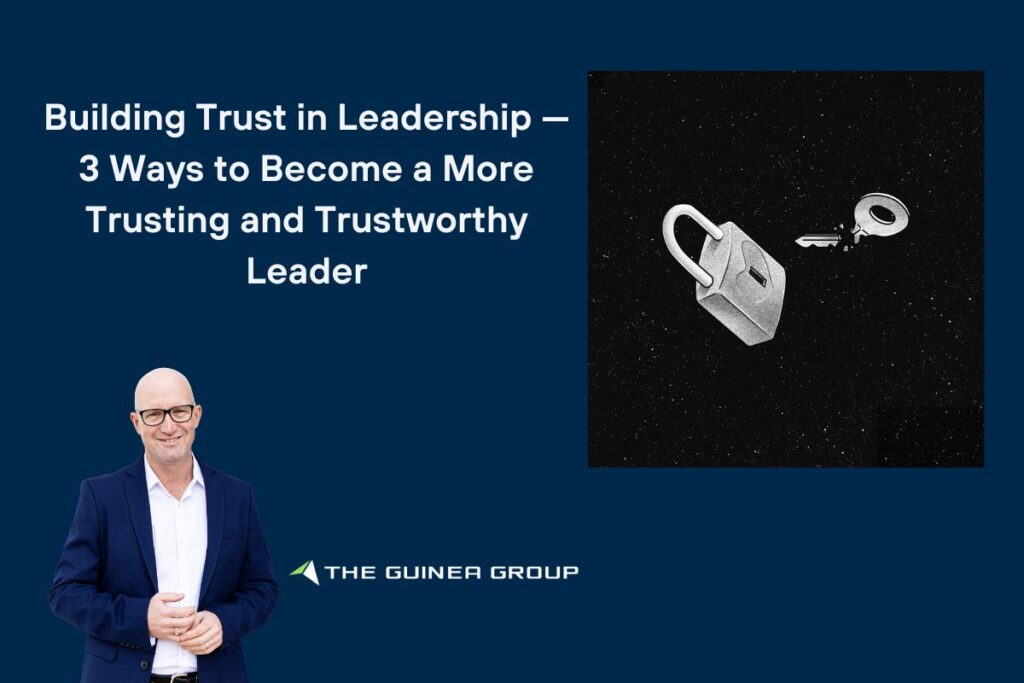Anton Guinea
Entrepreneur, Speaker, bestselling author, and founder of The Guinea Group of Companies. For over 15 years, Anton has helped leaders move their teams to become psychologically safe, physically safe and overall better versions of themselves.

Building Trust in Leadership—3 Ways to Become a More Trusting and Trustworthy Leader

Hello Leaders,
More than ever, trust is a pillar that employees and teams rely on. Trust doesn’t just create a good working environment—it fuels productivity, inspires innovation, and fosters genuine commitment.
However, building and maintaining trust in the workplace is no easy task. It requires leaders to be both trusting and trustworthy.
Some leaders are quick to trust, and others aren’t. Personally, I am a truster from minute one, and that trust lasts until that trust is violated. Other leaders I know take days, weeks, and months, to trust team members. If you are a DISC profiler, you will know that high Is trust quickly, and high Ds trust very slowly.
The same is true for our teams. Some of our team trust their leaders quickly, while others are slow to trust. Leaders need to be aware that trust is earned over a long period of time, one comment, one conversation, and commitment at a time. It can take a long time to earn trust, but it can only take one moment to lose it.
Let’s explore three impactful strategies to strengthen trust with your teams, creating a foundation that supports mutual respect, open communication, and collaboration.
1. Practice Transparent Communication
Honesty and transparency are the cornerstones of trust. When leaders communicate openly—whether sharing successes or setbacks—it sets a precedent for authenticity. This kind of transparency empowers your team to bring their authentic selves to work and feel safe to communicate openly as well.
How to start:
- Be transparent about decisions: Share not only the “what” but the “why” behind your choices. Explain the factors that shaped your decisions and acknowledge any uncertainties.
- Openly discuss challenges and setbacks: Rather than covering up mistakes, take responsibility and involve your team in finding solutions. This invites them to see you as an authentic, relatable figure rather than a distant authority.
Transparent communication nurtures a sense of security within your team. When they know you’re honest and forthcoming, they’re more likely to reciprocate, creating a cycle of trust that goes both ways.
2. Delegate Responsibility—and the Decision-Making Power that Comes with It
Delegating isn’t just about offloading tasks; it’s about empowering your team to take ownership and contribute meaningfully. True delegation also means entrusting team members with the authority to make decisions within their area of responsibility, signaling that you have faith in their abilities.
How to start:
- Set clear goals and boundaries: Communicate the outcomes you’re aiming for, then step back. Avoid micromanaging, and instead, let team members have the autonomy to shape how they meet these goals
- Encourage decision-making at all levels: Support them in making choices and taking ownership of their projects. Stand by them, even if there’s a mistake—this will solidify your team’s confidence and encourage them to trust you in return
When you trust your team with responsibilities and the authority to make decisions, you demonstrate faith in their capabilities. This approach builds mutual respect and trust, enhancing engagement and commitment.
3. Demonstrate Empathy in Everyday Interactions
Empathy is a powerful but often overlooked aspect of trust-building. When leaders show they care about their team members’ challenges and successes on a personal level, it fosters a supportive environment and deepens trust.
How to start:
- Listen actively: Instead of focusing on what you’ll say next, pay attention to what’s being shared. Show understanding through verbal and non-verbal cues, validating their perspectives
- Acknowledge individual strengths and challenges: Recognise each team member’s unique contributions and be considerate of the personal challenges they may face
- Show support during tough times: Be approachable, offering flexibility when needed. This not only builds trust but strengthens loyalty and cohesion within your team
Empathy sends a powerful message: you value your team members as individuals, not just as contributors to productivity. When team members feel respected and understood, trust grows naturally.
Wrapping Up: Trust as a Two-Way Street
Building trust is a continuous process that demands leaders to be both trusting and trustworthy. By practicing transparent communication, empowering your team, and leading with empathy, you can create an environment where trust flows freely in all directions. Remember, trust isn’t built overnight, but with consistent actions, you can create a workplace where people are genuinely invested in each other’s success.
Thanks for reading!
If you found this helpful, please consider sharing your thoughts or experiences with trust-building strategies in the comments.
Please click the image below if you’d like to chat about what leadership means to you

If you would like to learn more about Anton or The Guinea Group, please click here to book into Anton’s calendar, to:
UPGRADE your Mindset
UPSKILL your Leadership
UPLIFT your Teams
About Anton
Anton has dedicated his working life to helping leaders to upgrade their mindset, upskill their leadership, and uplift their teams! With a focus on helps leaders to better lead under pressure. Anton is an entrepreneur, speaker, consultant, bestselling author and founder of The Guinea Group. Over the past 19 years, Anton has worked with over 175+ global organisations, he has inspired workplace leadership, safety, and cultural change. He’s achieved this by combining his corporate expertise, education (Bachelor of HR and Psychology), and infectious energy levels.
Work With Anton!
Subscribe to our Newsletter